|
|
|
Sort Order |
|
|
|
Items / Page
|
|
|
|
|
|
|
| Srl | Item |
| 1 |
ID:
117856
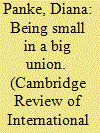

|
|
|
|
|
| Publication |
2012.
|
| Summary/Abstract |
Compared with bigger states, smaller states have fewer votes, less economic power, fewer administrative resources and less staff and experts. This leads to disadvantages in negotiations. Yet smaller states can concentrate their limited resources on issues of great importance and can-under certain conditions-punch above their weight. This is especially effective if small states use their ideational resources in applying different argumentative strategies. Each strategy is only effective under certain scope conditions. The vodka and the pesticides cases illustrate that active small states can punch above their weight if they make arguments that fit the nature of the issue and resonate well with prior beliefs of the addressees of the arguments. A regulatory issue that is technical in nature, such as the pesticides case, requires good scientific arguments. A political issue with prevalent distributive effects, such as the vodka case, calls for normative arguments to persuade neutral actors and the re-framing of the distributional elements into common-good questions to talk actors with opposing preferences into acceptance.
|
|
|
|
|
|
|
|
|
|
|
|
|
|
|
|
| 2 |
ID:
117857


|
|
|
|
|
| Publication |
2012.
|
| Summary/Abstract |
The role of small states has been largely neglected in research on the process and outcome of multilateral negotiations. Even though these states may be active in the agenda-setting processes or display a specific engagement in certain thematic aspects of negotiations, in the end game the outcome of negotiations has been perceived to be dependent on the bargaining between major powers. However, small states also have strategies at their disposal to compensate for these weaknesses. Two principal ones come to mind, prioritization or niche diplomacy, and coalition-building to join forces with like-minded states in order to draw on their resources, expertise and manpower. In the article, we compare two cases of small state coalitions in multilateral negotiations, namely the Like Minded (LM) group in the negotiations that led to the establishment of the International Criminal Court (ICC), and the Alliance of Small Island States (AOSIS) in United Nations climate negotiations. While the two coalitions resort to similar strategies, they have not been comparably successful. We will show that the ability to translate discursive power into measurable effects on outcomes ultimately depends on the institutional setting of the negotiations and the nature of the issue that coalitions are tackling.
|
|
|
|
|
|
|
|
|
|
|
|
|
|
|
|
| 3 |
ID:
117864


|
|
|
|
|
| Publication |
2012.
|
| Summary/Abstract |
This article discusses a number of significant negative externalities generated by free capital flows and analyses certain justifications for regulating the capital account regime as an efficiency-enhancing tool used to limit externalities. This interventionist tool may limit the deviation of private equilibrium from social optimization by both improving the composition of capital flows and mitigating the accompanying distorted incentive that creates externalities. To avoid financial turbulence or economic crisis, countries (in particular, emerging economies) are urged to avoid the damaging influences of free-market ideology.
|
|
|
|
|
|
|
|
|
|
|
|
|
|
|
|
| 4 |
ID:
117855
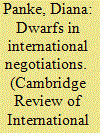

|
|
|
|
|
| Publication |
2012.
|
| Summary/Abstract |
Students of international relations interested in cooperation through international regimes and organizations very often devote their attention to the role of a few big states rather than the numerous small ones. Small states tend to possess fewer administrative and financial resources back home as well as smaller and less well-equipped delegations at the international negotiation table than big states. This can easily translate into difficulties in preparing positions for all items on the negotiation agenda and in developing negotiation strategies in great detail, which might inhibit small states from successfully influencing negotiation outcomes. Yet, since international negotiation often rest on a one-state, one-vote principle and since small states can adjust priorities and redirect their limited capacities, there is a window of opportunity for small states to turn into important international actors and achieve significant outcomes in international affairs. In order to systematically shed light on the role of small states in international negotiations, this article outlines the conceptual framework to answer the following question: How, and under which conditions, can small states successfully punch above their weight in international negotiations?
|
|
|
|
|
|
|
|
|
|
|
|
|
|
|
|
| 5 |
ID:
117861
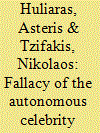

|
|
|
|
|
| Publication |
2012.
|
| Summary/Abstract |
Celebrities have been accused of oversimplifying the conflict in Darfur, of exaggerating the number of people killed and of cursorily labelling it the 'first genocide of the 21st century'. Celebrity activists have also been criticized for advocating drastic measures like military intervention, and for aggressively pursuing the fulfilment of arrest warrants by the International Criminal Court at the expense of quiet diplomacy and reconciliation, ultimately making matters worse. This article examines the role of two Hollywood celebrities-Mia Farrow and George Clooney-in Sudan's 'messy war'. It claims that most proponents and critics of celebrity activism overestimate the role that these two individuals played. Clooney and Farrow did not act alone but were latecomer adherents to a transnational advocacy network (the Save Darfur Coalition) and their role was more in strengthening than in altering messages.
|
|
|
|
|
|
|
|
|
|
|
|
|
|
|
|
| 6 |
ID:
117860


|
|
|
|
|
| Publication |
2012.
|
| Summary/Abstract |
Turkey is of paramount importance to the United States and to the European Union. The United States is not only the first and foremost partner of both the EU and Turkey. It is also amongst the most committed supporters of Turkey's European integration. In support of Turkey's EU membership bid, Washington has set forth a variety of arguments and has attempted to influence EU decisions at different points in time. US advocacy throughout the 1990s was key to kick-starting Turkey's accession process. By contrast, US influence on Turkey's EU accession decreased visibly in the twenty-first century. The style of US advocacy goes some way towards explaining why this has been the case. When American advocacy has prioritized quiet, behind-closed-doors diplomacy it has tended to be more effective. When instead US officials have relied on loud public diplomacy, European reactions have been generally negative. More importantly however, it is the content of American arguments that has affected their relative impact on European perceptions of Turkey. Depending on whether the US has spoken to the rights-, the interest- or the identity-based logic of enlargement, the influence of the United States on Turkey's EU membership prospects has varied. On the grounds of this analysis, this article concludes by outlining broad policy suggestions regarding how the United States could contribute more effectively to Turkey's European integration.
|
|
|
|
|
|
|
|
|
|
|
|
|
|
|
|
| 7 |
ID:
117862
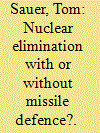

|
|
|
|
|
| Publication |
2012.
|
| Summary/Abstract |
The idea of nuclear elimination is becoming more popular. At the same time, missile defence is being built. The aim of this article is to link the two phenomena: does Global Zero require effective missile defence, or will missile defence hamper the road towards nuclear elimination? First, I will examine how proponents of the recent move towards nuclear elimination regard missile defence: are they in favour or against? This descriptive portion of the article is followed by a personal evaluation based on the literature. Assuming that nuclear elimination becomes a priority in order to win the fight against nuclear proliferation and nuclear terrorism, and assuming that missile defence will not become reliable under real circumstances, then the best option seems to be zero offensive and zero defensive ballistic missiles. Second best would be to limit the existing missile defence capabilities to theatre missile defence, excluding those theatre missile defence systems (like advanced SM-3 missiles on Aegis ships) that can easily be plugged together to form a strategic missile defence capability.
|
|
|
|
|
|
|
|
|
|
|
|
|
|
|
|
| 8 |
ID:
117858


|
|
|
|
|
| Publication |
2012.
|
| Summary/Abstract |
In recent years, studies have challenged the conventional power-based literature to show that a deficiency in resources does not limit a small state's bargaining leverage in international negotiations. However, few studies examine small state influence during compliance bargaining, the post-agreement bargaining to ensure that all signatories comply with the terms of an agreement. Using an interview with a key advisor to the small twin-island state of Antigua and Barbuda during compliance bargaining with the United States (US), and World Trade Organization (WTO) documents, this article examines how a small state can successfully attain bargaining leverage and win against a behemoth state. In this case, Antigua successfully challenged the US ban on cross-border internet gambling and betting services. The article argues that the strategies and tactics that Antigua used within the WTO dispute settlement framework contributed to the country's bargaining leverage and enabled it to punch above its weight.
|
|
|
|
|
|
|
|
|
|
|
|
|
|
|
|
| 9 |
ID:
117859


|
|
|
|
|
| Publication |
2012.
|
| Summary/Abstract |
There are many small states in the international system, which have considerably fewer capacities than their bigger counterpart. The study of multilateral negotiations in the European Union (EU), conferences taking place under the umbrella of the United Nations (UN), negotiations on the set up of an International Criminal Court (ICC), as well as the compliance bargaining in the World Trade Organisation (WTO) reveals that small states can sometimes be very influential-despite their size. Small states tend to be most likely to punch above their weight if the negotiations take place in an institutionalised arena with majority-based decision-making rules in which each state has one vote or in contexts in which decisions are made unanimously, if they are selective in negotiations and concentrate their capacities on the most important issues, engage in capacity-building activities to maximise their ideational resources, if they make use of institutional opportunity structures such as chairing meetings and engaging in agenda-setting, and if they individually or collectively apply persuasion strategies from early on.
|
|
|
|
|
|
|
|
|
|
|
|
|
|
|
|
| 10 |
ID:
117863
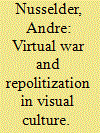

|
|
|
|
|
| Publication |
2012.
|
| Summary/Abstract |
This article discusses Andrew Hill's book Re-imagining the war on terror with a special attention to the unconscious mental dimension of the conflict. Clarifying this symbolic, signifying dimension can help us to traverse the fantasies that we are so easily trapped in. Thus it opens the way for introducing a moral and political position in the War on Terror and in visual culture in general.
|
|
|
|
|
|
|
|
|
|
|
|
|
|
|
|
|
|
|
|
|